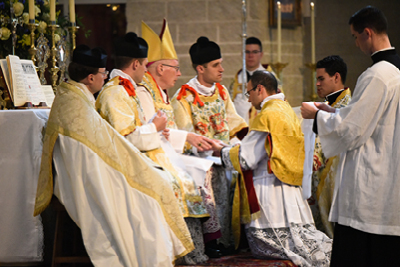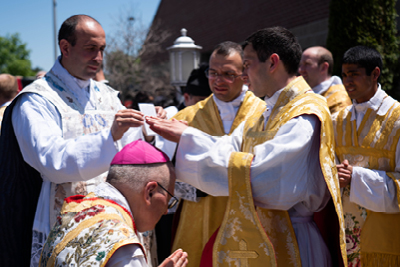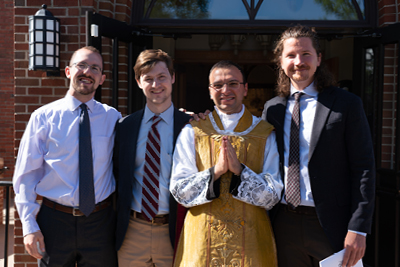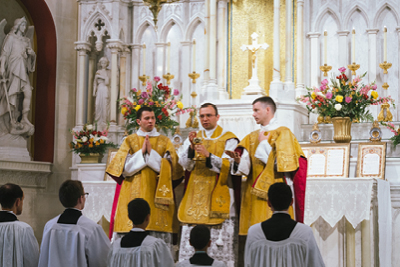 Menu
Menu
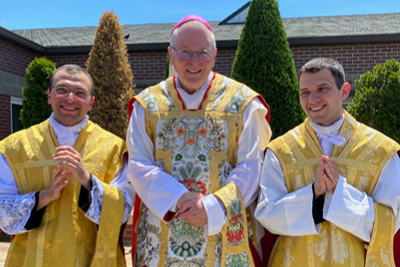
About midday of Friday, May 27 — a frightfully hot but otherwise ordinary day — at the North American Martyrs Church in Lincoln, Nebraska, something remarkable occurred, at once unusual in the life of the Church and possibly without precedent in the history of our school: Two brothers, both alumni of the University of Dallas, were ordained priests together, in a Mass celebrated according to the ancient rite of the Extraordinary Form. In a few moments’ time, two brothers became Fathers, to the wonder of family and friends, who with awe contemplated the workings of Providence. This is a story of how it all came to pass.
The brothers Ramirez, David, BA ’13, and Edgar, BA ’17, were born in verdant Louisiana, in 1991 and 1992 respectively, but the family moved back to Texas just as soon as it could. Out in the West Texas town of El Paso — hometown of their Mexican-American mother and adopted home of their father, an immigrant from Tecomatlán, Mexico, a small ranching village near Guadalajara — David and Edgar, along with their two sisters, Sandra (Allen), BA ’09, and Deana, BA ’19, were reared by parents who, in Edgar’s recollection, “were always faithful in taking us to Mass every Sunday and Holy Day of obligation, and in teaching us the Faith.” Their “example of virtue, of hard work, and of generosity toward others and toward the Church,” David believes, “helped teach us how to live as Catholics.”
Openness to the priesthood runs in the Ramirez family. One of the brothers’ maternal great-grandfathers was studying to become a priest when the seminaries in Mexico were shut down amidst violent repression of the Church. Unable to obtain the documents needed to leave for Europe to continue his seminary studies, he stayed in Mexico, met a woman, and started a family. Closer to their own day, the brothers’ father spent some time in the minor seminary in Guadalajara, and throughout their childhoods their maternal grandmother — wise, as grandmothers so often are — always said that David would become a priest.
Edgar, whom David regards as the holier of the two (he is also “cooler” and a better soccer player and sports a far more robust head of hair), “felt called to the priesthood at a very early age, probably around six or seven years old,” though he did not begin a “serious” discernment until he was about 15. David, meanwhile, traces the discovery of a call to his college years, especially to his “time spent in prayer in the adoration chapel at UD.” The call grew louder as his four years in Irving rolled along, but this biology major, set on medical school, “tried to ignore those desires in my heart to look more seriously into the priesthood.”
Edgar entered the seminary first, in 2013, two years into his studies at UD. His older brother was “proud of and happy for” him, and their parents were, as was their way, “supportive but in no way forceful,” wanting only that Edgar, like all their children, “follow God’s will.” But the timing was not right: “I was simply not ready to be at the seminary at the time when I first entered.” And so, in 2015, Edgar returned to UD, finishing two years later with a B.A. in theology.
In 2013, the year of Edgar’s start in the seminary, David earned his B.A. and then began studying at Texas Tech’s medical school in El Paso. Right around that time — providentially, in David’s view — Bishop Mark Seitz, BA ’76 MDiv ’82, invited the Priestly Fraternity of St. Peter to take charge of El Paso’s Immaculate Conception Parish. The FSSP, which was blessed by St. John Paul II in 1988, celebrates the seven sacraments exclusively according to the Extraordinary Form of the Roman Rite.
The Ramirez family had discovered the Latin Mass when the boys were in high school, at a parish in El Paso. David’s initial reactions were mixed: “I admit I didn’t fall in love with it right away. In fact, at the beginning I wasn’t a big fan.” What both brothers did appreciate, and what led to their developing a deep attachment to the older form of the Mass, were its silence and its reverence.
In the Latin Mass, Edgar finds that the principle of lex orandi, lex credendi (“the law of prayer is the law of belief”) is actualized. In the text and in “the pervading silence that surrounds the consecration and elevation,” he sees expressed the truth that the Mass is a sacrifice, and in the reverence demonstrated by the priest to the Eucharist, as shown by his “many genuflections” and “his care not to separate his index finger and thumb after he has handled the Sacred Species,” Edgar sees expressed the truth of the Real Presence.
Moved similarly as his younger brother, David marvels: “Something so beautiful and so timeless as the Latin Mass drove me to leave all my plans and my career behind so that I could devote my life to offering the Mass for the good of the entire Church and the world.”
Naturally, given their love of the Old Mass, in college the boys often attended Mater Dei, the booming FSSP parish in Irving (though in a sign of the catholic nature of UD Catholicism, David also cites the positive influence of UD’s Dominicans and Cistercians, of Monsignor Thomas Fucinaro and Father Rudy Garcia, and of the nearby Opus Dei priests). Naturally, too, when first Edgar in 2013 and then David in 2015 responded to their priestly vocations, both selected Our Lady of Guadalupe Seminary, an international house of studies for the FSSP located in beautiful Denton, Nebraska, a few miles outside of Lincoln.
It was while “serving in the sanctuary” during daily Mass at the aforementioned Immaculate Conception Parish that the would-be Dr. David Ramirez turned definitively onto the path that would lead to his becoming Father David Ramirez. He had long “loved the reverence and the beauty of the Latin Mass,” but now, as an altar boy, he was so moved by the “incredibly beautiful and timeless prayers” that he “found it impossible to keep ignoring the thoughts about becoming a priest which were surfacing in my mind.” Resisting no more, he decided, in 2015, to enter Our Lady of Guadalupe.
Texas Tech gave David one year as a sabbatical but said that if he stayed away beyond that year but later decided to return, he would have to begin his studies anew. His parents supported his decision, as they had supported Edgar’s, but also thought that it might be wiser if he finished his medical studies first. This was a reasonable thought, for what if David were to discern out of the seminary after two or three or five years and find himself in his late 20s with no job, no savings, and only a B.A. in biology to his name? Nevertheless, trusting in God, he set out into the deep.
Two years later, in 2017, immediately after graduating from UD, Edgar was readmitted to his old seminary, and, having been given credit for his earlier two years of study, found himself a classmate of his older brother’s. The brothers Ramirez were now the seminarians Ramirez, a situation congenial to them both, for each had a brother to turn to if he needed to talk and a driving partner on the 16-hour rides home.
Our Lady of Guadalupe treated both brothers well. Life there, says Edgar, “could be hard at times,” but “the seminary is definitely a spiritual oasis where real growth takes place.” Days begin with Lauds at 6:20 each morning and proceed with meditation, Mass, meals, classes, recreation, more prayers, more classes, Vespers, Compline, and some study time.
Besides prayer and academics, social life is crucial to the seminarians’ formation. The seminary seems to have something of a barracks-quality to it: “You need to have a good sense of humor and be easygoing to survive the seminary,” observes David wryly. Studying not only with Americans but with men from all the lands in which the language of Milton and Lincoln is spoken — from Mexico, Canada and the Caribbean to the British Isles, Africa, the Subcontinent and Australasia — the brothers surely grew in appreciation of the Universal Church and of the similarities and differences, some beautiful and some maddening, that mark the human race.
Edgar, to be sure, being as noted previously the “cooler” and more athletic brother, proved more popular among their fellow priests-in-training; yet David received his plaudits too: “David is probably the chillest person alive,” is how an Irish classmate put it. A certain “chillness” surely serves all the seminarians, who, in the manner of the FSSP, wear the traditional black cassock almost all the time when out in the world. “You get used to the stares eventually!” quips David, who reports that nowhere in the United States has he ever received a negative response to his outfit but rather much curiosity and many requests for advice, prayers, blessings and confessions.
In the end, both brothers made it through the seven years of seminary formation, and so found themselves, on the morning of May 27, 2022, processing side by side into the North American Martyrs Church. Friends and family came from hither and yon, from Mississippi to Mexico and from Pennsylvania to Texas, many driving the 10 hours up from Dallas and the 16 hours over from El Paso. A particularly grievous sinner flew in from the Holy City, and a particularly heroic friend drove 10 hours through the night from St. Louis, thereby minimizing time away from his sick and pregnant wife, who would not hear of his not attending.
The Ordination Mass, long and beautiful and celebrated by the Most Reverend Thomas Edward Gullickson, Titular Archbishop of Polymartium, felt out of time: ever-ancient and ever-new. The seven ordinandi stood, knelt and lay prostrate; they were spoken of and spoken to and audibly gave thanks to God; they approached the bishop multiple times, receiving from him the laying-on of hands and the Holy Oil of Catechumens and presenting to him a lighted candle; and in the end, having been transformed from ordinandi (“they who are to be ordained”) to ordinati (“they who have been ordained”), they concelebrated the sacrifice of the Eucharist.
All the while, their younger classmates chanted solemnly from the choir loft. Perhaps it was a trick of the ear, but never had the Te Deum and the Veni, Creator Spiritus sounded so much like the singing of angels as they did that day and during the brothers’ first Masses the next morning.
The Ordination completed, with countless tears shed by those in the pews and the faces of the ordinati themselves seemingly transfigured by the conferral of the sacrament, the rejoicing commenced. Outside the church came round after round of hugs, first blessings, laughter and photographs. All then repaired to the seminary’s grounds for a reception that combined tuna salad, egg salad and Nebraska beer with more hugs, first blessings, laughter and photographs. The celebration continued that evening — fortunately, a somewhat more substantial meal was served — at the Seward County Agricultural Pavilion, set in a beautiful Nebraska landscape of cattle, dirt roads and big skies.
The next morning saw the new priests’ first Masses. The Father-brothers celebrated theirs at Lincoln’s St. Francis of Assisi, a handsome little gem of a church. Father Edgar served Father David’s 8 a.m. Mass, at which the older brother gave their nephew, Michael, his First Communion, then Father David served Father Edgar’s 10 a.m. Mass. The brothers’ parents received Communion second at their older son’s Mass (after little Michael) and first at their younger son’s. Mr. Ramirez was openly moved, but Mrs. Ramirez proved harder to read. What was she thinking? What thanks could she have been rendering to God, in return for being given as sons not one but two future priests?
Perhaps she thought of Mary, the mother of Jesus, whom Father Edgar honored with one of his Mass cards, choosing, from Psalm 115, the words: O Domine, ego servus tuus; ego servus tuus, et filius ancillae tuae (“O Lord, I am Thy servant; I am Thy servant, and the son of Thy handmaid”).
“I love Our Lady so much,” Father Edgar says. “She is everything to me. I ascribe to her not only my vocation but my whole spiritual life.” He selected those words because, heeding the teaching of St. Louis de Montfort, he sees in them “a double or twofold entrustment, a twofold surrender, to God and to Our Lady.”
Or perhaps Mrs. Ramirez had in mind the words chosen by her older son for one of his own Mass cards: “Come to me, all you that labor, and are burdened, and I will refresh you. Take up my yoke upon you, and learn of me, because I am meek, and humble of heart: and you shall find rest to your souls. For my yoke is sweet and my burden light.”
Raising four children must at times feel like a burden, and surely for a mother rest is often scarce. Perhaps Mrs. Ramirez has, like Father David, “found spiritual refreshment, the rest of soul and peace,” when sitting “before our Lord in the Blessed Sacrament.” This rest — which, Father David believes, all people are “ultimately seeking out, whether they realize it or not” — “is,” however, “not,” he insists, “a rest of nothingness, of having nothing to do, of having no worries or burdens, but rather a rest of loving union with God, which we can have in spite of all our anxieties, and our burdens and worries. He remains with us, a prisoner of Love in the tabernacle, so that He can offer all those who come to Him His true rest.”
For his part, Father David found that celebrating his first Mass “was the most peaceful and most refreshing thing that I have ever done.”
The brothers found it “amazing” and “a tremendous blessing” to be ordained together. Now, however, they will live out their vocations apart. Father David, coming full circle, will be serving at Mater Dei in Irving, while Father Edgar will minister five and one-half hours north at Our Lady of Sorrows in Springdale, Arkansas. The older brother, asked what sort of priest he wished to be, answered simply: “a holy one.” No doubt the younger brother, who is “looking forward to being a spiritual father to my parishioners,” harbors the same aspiration.
It is only in retrospect that we can read the plan of God for our lives. So say the aged and the wise. The persecutors of the Church in Mexico perhaps went to their graves pleased with what they had accomplished, not imagining that 100 years later, in the Great Plains of the United States, two great-grandsons of a man they had driven from the seminary would more than compensate for the damage they had done.
Esperanza González somehow knew that her grandson David had a vocation to the priesthood. She died in 2013, the year in which David had seemingly decided to become a medical doctor, but nine years later, not only David but Edgar too would become a doctor of souls.
And for this writer (if he may at last remove the authorial veil), it is clear only now, nine years on from that bittersweet May when they all said farewell, that the two years he spent rooming with “Daveed,” through whom he met “Eggy,” were not the mere passing joys of a season but the honor of a lifetime.
Daniel Orazio, who was a classical philology major at UD, is currently a student in the Department of Christian and Classical Letters at the Pontifical Salesian University in Rome, Italy.
